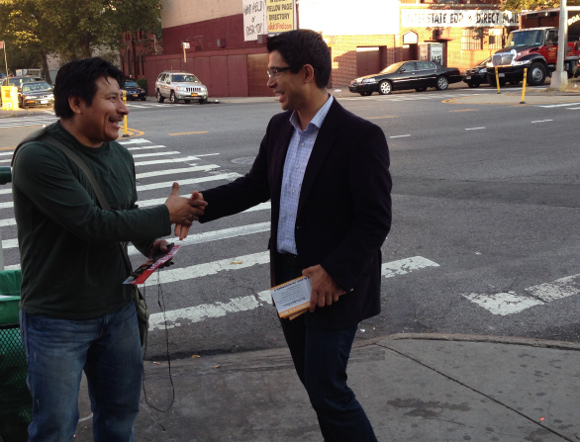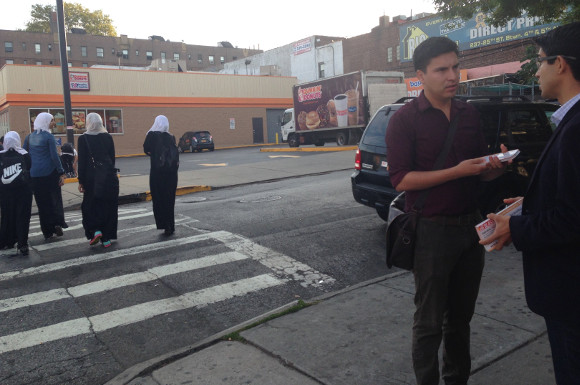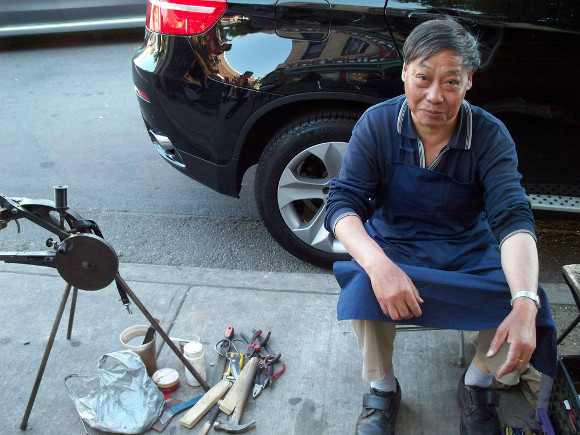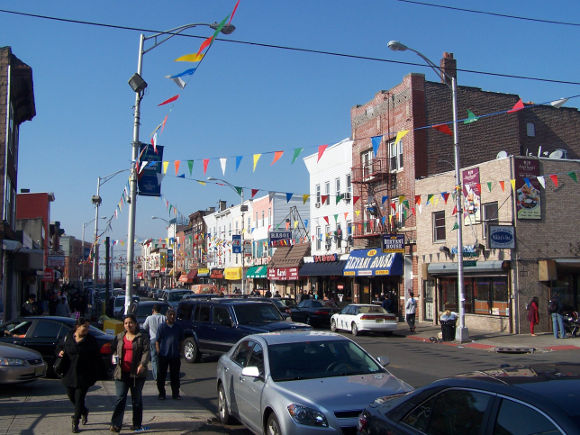“Manhattan gets everything. No more, no more…Our next mayor is going to be from Brooklyn no matter who wins.”

October 15, 2013
It’s 7:45 on a cloudy autumn morning and Carlos Menchaca, the young upstart who will be the next City Councilmember for south Brooklyn, is canvassing outside of the 25th Street subway station in Sunset Park.
Menchaca, nattily dressed in dark jeans, a fitted blazer, and glossy wingtips, is passing out fliers for Bill de Blasio. “I’m Carlos Menchaca, don’t forget to vote for me and Bill de Blasio in November!” he calls out. The morning rush is in full swing, which means he’s more often ignored than not. One man yells out to him, “I never vote!” which seems a particularly harsh response. “That’s not even the worst,” Menchaca says.
Despite the cool welcome he’s getting this morning, Menchaca, who defeated two-term incumbent Sara Gonzalez in the Democratic primary in early October, is on the rise, hailed–along with Bill de Blasio and Leticia James –as standard bearers for a new progressive leadership. A former aide for Brooklyn Borough President Marty Markowitz and City Council Speaker Christine Quinn, Menchaca worked in NYC politics for almost a decade before throwing his hat in the ring earlier this year.
Flyering done, Menchaca unlocks his bike (a one-speed) and suggests a coffeeshop around the corner to continue our interview. Small ethnic bakeries dot this neighborhood, so I’m surprised when we end up at Baked in Brooklyn, a sleek white brick building on 5th Avenue with a décor that leans towards industrial chic, and a menu that’s more brownstone Brooklyn than panaderia. Inside, our interview is set to a soundtrack from the late 90s, high school and college years for Menchaca. “Is this NSYNC or the Backstreet Boys?” he asks as we walk in. (It was BSB.)
Did you think you’d be running for City Council at the age of 33?
I’ll start with a lot can happen in a year. A year ago this time, we were two weeks before Sandy, and I was working for the City Council as Chris’s [Quinn] LGBT liaison doing really good community organizing with organizations citywide, really trying to focus on immigrants, people of color communities within the HIV and LGBT world, and really enjoying my life in public service.
And if you would have told me that, Carlos, you’re going to be a council member, I would have been like, yeah right, whatever, it’s not happening…And what changed, was Sandy. When Sandy hit the city, it was this moment of crisis for this community that was not a policy thing. This was a natural disaster. It changed the way I thought about government, the importance of government, and the importance of having good leadership.
The urgency was very real after Sandy hit, and so many of us got together, within the city council office, and we were all dispatched to different areas. I rode my bike to Red Hook, from Park Slope, and saw the work that needed to be done…Long story short, I saw a need, an immediate crisis, jumped in, and then realized that actually the need was greater than just this moment, it was going to be a long-term recovery. So I built this idea that I’m here, I’m gonna be here for this community for as long as I can be here, and I [didn’t] know what was next, but what was very clear was that the community was like, we need you as a council member. It was very clear that they were not happy with the council member, because the council member would come and go and not really be substantive for them.
You only recently moved to the district, and you’re actually from Texas. Were there any challenges around you not being a native New Yorker, not having long roots in the neighborhood? Did the term ‘carpetbagging’ ever come up?
That word has only been used in my presence, maybe ten times in the whole six months. Now clearly there were issues, there was a whole campaign built around the fact that I’m from Texas. Jobs for New York, REBNY, these super PACs spent a lot of money. [In] total, all the super PACs spent over half a million. But, we quickly and immediately and I think strategically shifted the conversation… And I think it was effective, it immediately built a bridge with folks in public housing because I grew up in public housing, it connected to Red Hook as a whole because I was a community organizer and I knew them because I’d already worked with them. That was going to be a base for me.
It was really coming to Sunset Park, it was coming to the Puerto Rican base for our opponent and talking to them about the issues. It was coming to the Chinese community and talking to them about my immigrant roots and talking about how I understand how it is when I go to a door, mom doesn’t speak English, but the 4-year-old, 7-year-old daughter and son can speak English, talking through them about the election and the importance of that. And people got it, people got it immediately.
And I’m also an openly gay man, and very proud of that, and that rarely played a role as a liability. So all these things were secondary to the main point, that they needed visible vocal leadership, a leader for them.

Looking at the demographics of the district, it’s one of the most diverse in NYC. You have the public housing in Red Hook, you have the newer residents who are more affluent and whiter, the Chinese, Italian, Puerto Rican, Mexican, Polish, Muslim, Arab residents. How do you plan on representing all of their interests at the same time, while also holding on to your own politics?
One of the things we learned quickly through the campaign in the conversations we were having with people at the door, is that actually the needs don’t change through these communities. They all want good schools, they don’t want to bus their kids, they don’t want to do it. Those who can’t afford it want to–but can’t. They want good schools. That example really unifies a community, whether you’re a Jewish Hasidic family in Borough Park or a Red Hook family in public housing.
And so what we need to do is really change the conversation from the differences of these different communities that are immigrant based, and really start connecting the dots on that. We all want good parks, we all want access to the waterfront, we all want good jobs, and actually, it doesn’t matter where you fall on an income basis, those are important things for the community.
Spanish, English, Chinese. All three dialects are spoken strongly in Sunset Park–Fukienese, Cantonese, Mandarin. And I’m gonna learn Mandarin.
Do you know any already?
Well, my favorite word is “zhu rou,” pork, because I love pork.
That’s useful as a future elected official, to know the word “pork.”
To know pork? Yeah [laughs]. My stomach is what rules me sometimes, I love to eat. I love food.
You’re representing a really good district if you love food.
Oh yeah, every corner of this district has pretty amazing food.
But to get back to language, Arabic is also a language that a lot of people speak in the community. So that’s how we’re going to do this….We can’t do it without being together and if we come together as a district, then we have a more powerful voice when we need to go to City Hall to ask for funding. And make sure that those funds come back to this community. And people get that.
What are some of the main issues confronting Sunset Park?
If we focus on Sunset Park, I think one of the major issues is the overcrowded schools, that for so many immigrant parents is so important. Even if, when we’re speaking to them–and by them I’m really focused on immigrant families and working families–they started with education, making sure that their kids have the best opportunity possible, even if they had to work four or five jobs. I mean it was that kind of, “I know what I came here [for], I’m going to work, we’re going to live in this place, I’m going to work harder so we don’t have to live in this place, but my kids better get the best education possible, because that’s why we’re here.” So it was real, I understood the sacrifice.
Do you have a specific legislation that you’d want to push?
Yes! One of the things that we need to start talking about immediately in this next council is creating a mandatory affordable housing requirement for future development.
As a former housing organizer, that is music to my ears.
Absolutely and as a former San Franciscan, they have mandatory inclusionary housing. There, any developer can do whatever they want to do, but they have a certain percentage to meet, onsite, not offsite. What we’ve experienced in Williamsburg was a disaster, they’re pushing all their affordable housing units out, and we as New Yorkers understand that we all live together, and that’s a culture we need to promote in our legislation, that was never going to happen under Bloomberg, never going to happen under the previous city council.
How do we do this together? We’re not going to fight [real estate developers], we want them to be partners, and that’s what I’m really excited about…And there’s other ways we can use our capital resources to create units, but those are piecemeal, those are separated, and those are good, but we need a city-wide approach for all future development.
What are your plans for the City-led waterfront development project that’s going to have a huge impact on Sunset Park?
It’s started, we’re seeing the beginnings of that. And what I have to say about the waterfront, not just for Sunset Park but also for Red Hook, is really understanding how to activate it in a way that brings local jobs, good paying, local jobs…and because so much of [the waterfront] is “as of right” [development] we need to work with and build relationships with the developers, and the businesses that are coming in, to connect them to the community in ways that they probably have never been asked to do before.
I’d rather create strong relationships with these companies coming in. So that’s the kind of stuff we want to start working on. With the waterfront specifically here in Industry City, where you’re going to see a lot of boom in tech companies, manufacturers that are light manufacturers, food industry manufacturers, these are perfect for jobs that are for families that live in Sunset Park. And we need to bring a lot of investment to the waterfront so that we can actually go to the water and be next to the water, this is an asset, it’s a huge asset. These communities for years, for generations have been asking for that, and no one’s come through. So that’s going to be a big priority.
I walked along the waterfront and one thing I did notice was how hard it was to get to the water. In some ways, it doesn’t even feel like part of the neighborhood.
That needs to change, and that’s something I heard a lot from folks on the doors, talking to people about the importance of that. So we’re going to carry that voice into the city council, make sure that the next administration through EDC [NYC Economic Development Corporation] and all the other development agencies within the city really focus on that. We’ve already seen how they focus on that, in Williamsburg, Dumbo, and Brooklyn Heights, now it’s our turn.
And in Manhattan, along the East River and the Hudson.
Oh and Manhattan, I forgot about it. Manhattan gets everything. No more, no more. And it’s great, our next mayor is going to be from Brooklyn, no matter who wins. I mean, Bill de Blasio will win.
Just hearing you talk, I would describe what you said as a pragmatic progressivism in terms of how you view the role of politics and working with private industry, and creating benefits for residents. Is that accurate?
I think that [pauses] yeah! Yeah, absolutely. And I think it’s about honoring everyone’s role in all of this. I think, that’s when you come into a conversation, you come to a table where you honor everyone’s role because everyone has a role, and we can move together as a community. And I’m bringing that not just as an ideal, but I’m bringing that with practice.
[Menchaca’s campaign manager interrupts to remind him of another appointment.]
Is this good?
I did have a couple more questions. I would love to hear your thoughts on what you think of your former boss.
[Pauses] I’m glad we stopped here. You mean Marty Markowitz right?



